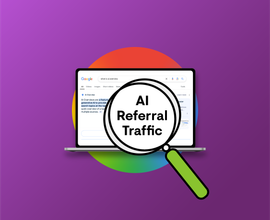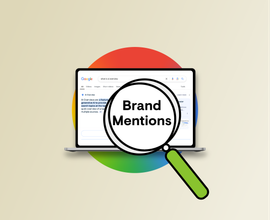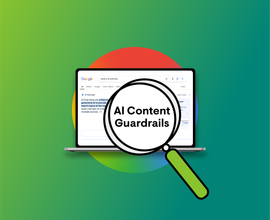How to Leverage SEO and PPC Synergy to Increase ROI
Leveraging SEO & PPC synergy is one of the most effective ways modern marketers can increase ROI and make the most out of limited spend.
On many modern marketing teams, PPC (pay per click, or paid search) and SEO (search engineSearch Engine
A search engine is a website through which users can search internet content.
Learn more optimization) functions are siloed. Such organizations suffer from a lack of communication and spending inefficiencies. Aligning paid and organic efforts is key to constructing a successful enterprise digital marketing program and improving ROI.
Google search behavior underscores the importance of linking the worlds of organic and paid. A full 25% of searchers click on the first organic result ; you should try to earn that first spot using SEO, especially since organic traffic converts at almost two times the rate of paid traffic.
When Google displays an ad for a given search, however, the clickthrough rate for the first result decreases by 30% . So, sometimes it’s not enough to own the first result—you’ll want to bid on paid keywords for that term as well. There are many other situations where you should consider bidding on keywords via PPC. And when you own both paid and organic search results, you can ensure that your brand dominates the first page—and earns the lion’s share of clicks.
To help organic marketers on this front, Conductor recently hosted a webinar with two of the leading paid and organic marketing software platforms. Experts from Conductor and Adthena highlight the reasons why you should care about both channels, as well as how their new strategic partnership can help. In this post, we’ll highlight the top takeaways from the webinar and include additional insights to maximize your strategy.
Why it’s PPC and SEO, not PPC vs. SEO
Top executives and marketers know that organic marketing isn’t an either/or proposition. Put another way, SEO and PPC marketing strategies are not at odds; they complement each other. A healthy marketing strategy invests in both organic and paid search. Such a hybrid approach utilizes each channel’s unique attributes to create value for advertisers and visitors. The relative budget you allocate to each depends on your goals, organizational capacities, and even the season (for example, you may want to increase paid spend during a major sale to boost overall traffic to your site).
As Pat Reinhart, VP of Customer Success at Conductor, says, “one of the biggest mistakes companies make is that they separate the paid team and organic team.” Communication is key, and, “when you can get those two working with one another, then there’s some magic that happens.”
Key benefits and strategies of PPC and SEO synergy
Paid and organic teams have many of the same objectives— a more synergistic approach can benefit your brand in a variety of ways. In this section, we discuss how you can maximize a limited budget while boosting your visibility, as well as how you can improve your content strategy and enhance alignment between teams.
Optimize your marketing budget
It’s a fact that marketers have to compete for limited budgets. Companies often funnel far more funding into PPC than SEO because it’s easier to prove short-term ROI with paid. Not only is there long-term value in SEO—an investment that pays major dividends down the line—but it also protects you from CPC inflation , which has been rising in recent years. As Gary Galloway, Senior Director of Product Marketing at Adthena, explains, “We don’t have a bottomless budget. We’ve gotta be very mindful of our budget and our spend, especially in times like now. And paid and organic, I’ve seen them work best when they’re really prioritized together.” In other words, there’s tremendous opportunity for companies to optimize their spend by creating efficiencies between their paid and organic teams.
First, PPC teams should send their list of paid keywords to organic teams in order to track and report on them. This helps with budgeting in numerous ways. For instance, in most situations, you shouldn’t waste your budget by bidding on keywords that you are already winning organically. Organic traffic generates higher quality conversions and leads, so it’s best to focus on maintaining the ranks you’ve already earned and save on PPC spend.
Conversely, you may want to use those savings by bidding on keywords that are underperforming. This is especially true for keywords that you are unlikely to win, like competitor brand names and saturated SERPs. Note that performance tracking is a moving target. You may want to start by bidding on terms you currently rank for on page 2. Then, by investing in SEO efforts to move those striking distance terms onto page 1, you can reduce more pricey paid spend and allocate it elsewhere. Paid search informs your organic strategy, and vice versa, in a virtuous circle that drives down costs.
Win product categories in paid and organic search results
Paid and organic synergy also allows you to boost your visibility across distinct keywordKeyword
A keyword is what users write into a search engine when they want to find something specific.
Learn more categories. Since the two channels operate in different ways—in paid, you buy visibility, while in organic, you earn visibility—combining them helps you leverage your existing strengths while bridging any gaps that may exist.
For instance, say your company is launching a new product line. It’s likely that your website does not yet have much organic visibility for that category. While you work to build your (long-term) organic presence, you’ll want to strategically bid on paid terms to ensure your name is getting out there in the short-term. You may even consider bidding on competitor-branded searches to get your name above the fold. Paid helps with the education phase of product launches, while organic helps maintain a stable, long-term presence.
Adapt to new opportunities and scale content
Unifying paid and organic helps marketing organizations create a scalable content strategy that is more agile and adapts to new search opportunities. Some examples include:
- Algorithm Updates - You cannot always predict search engine algorithm updates or how those updates will affect keyword performance. Paid campaigns can be a short-term safeguard for search terms that are impacted by algorithm updates. Paid search offers you a level of short-term control that organic lacks. You can easily shift paid budgets around, but organic can take longer to recover from a hit. Google is more volatile than ever, so having an effective paid campaign in place can be a great support system for your organic search strategies. It can help maintain brand visibility and engagement amidst any new algorithm changes.
- Testing and Optimization - Search is all about testing, and different parts of your strategy can be informed by search intelligence. From a paid perspective, you can test different layouts, messaging, and approaches to optimize content for the best returns. Paid and organic synergy really shine when they work together here. SEO can help identify keywords that can be used for future paid campaigns, and paid campaigns can be used to test different creative messaging and positioning strategies. Without connections between your paid and organic teams, it would take longer to draw conclusions and could delay the impact it has on your brand.
- Competitive Ad Copy - Search term opportunity also allows you to optimize your content, specifically in comparison to competitor ad copy. Identify search terms that competitors aren’t winning. Perhaps you can pay a higher cost per click for those specific search terms and make them a high priority. Get a jump on the competition in order to capitalize on these opportunities.
Consider a real-world example During the beginning of the COVID-19 pandemic, many U.S. retailers saw a shift in consumer behavior. As discussed in the webinar, savvy retailers were able to monitor the competitive landscape, learning from competitor ad copy that included search terms relating to free shipping and curbside pickup. This helped informed retailers on how to position themselves strategically. A holistic approach grants you more meaningful insights into competitor keywords and findings, so you can determine the best way to adapt your strategies and investments. As Pat Reinhart mentions in the webinar, “search can influence every part of your business if you allow it to.”
Align paid and organic teams
SEO and PPC alignment also helps you construct stronger, more resilient teams across your marketing organization. As already discussed, constant communication between your teams can help them all succeed. Internal education opportunities allow marketers to learn from each other outside of formal trainings. Unity creates more cohesion amongst teammates, building stronger organizations and employee retention. You may also find that you can get by with fewer staff by combining some paid and organic responsibilities.
Synergy also helps diversify the reasons for your success. Unified PPC and SEO teams act as safety nets if one side were to take a hit. Overall, alignment makes your company less reliant on a single marketing channel. For example, if a major algorithm update causes your organic visibility to tank, you’ll still have a paid strategy to carry you through the crisis. Likewise, if Google decides to increase CPC costs dramatically, you’ll already have an SEO infrastructure in place to maintain your online presence. Paid and organic combination improves resilience and efficiency.
Integrate paid and organic marketing with Conductor and Adthena’s strategic partnership
Want to implement some of the above advice? Conductor and Adthena have joined together in an exciting strategic partnership, offering holistic search marketing intelligence solutions for enterprise brands and customers. Through this partnership, marketers will have access to unparalleled marketing insights and competitive intelligence across paid advertising and organic marketing channels. Brands will be able to make smarter investment decisions and maximize ROI with a complete view of their digital landscape.
Conductor’s platform and services provide comprehensive technical SEO, content optimization, content creation, and SEO reporting. Adthena, meanwhile, is a search intelligence platform that provides competitive analysis, strategic insights, and a team of experts to help brands, marketers, and agencies dominate their competitive landscapes. With access to both, current customers and new adopters will have stronger, more integrated intelligence to dominate their competitive landscapes. For instance, report on the organic performance of your Adthena paid keywords with Conductor’s platform.
With Adthena and Conductor, marketers will get a truly comprehensive picture of their search landscape across both organic and paid, increasing their efficiencies in both channels and propelling their brands towards even more success.
Holistic strategies are the way (and here to stay)
It’s no longer paid vs. organic search but paid AND organic. PPC and SEO are not competitors but partners in the digital marketing landscape. Together, the two practices can help you drive leads, conversions, and customer loyalty.
The future of marketing is holistic and customer-first. Organic insights are key to understanding your customer, and paid will boost your visibility, recall, and reach. Approaching both with the same mindset is key to a successful synergistic digital marketing strategy.
Start leading the way today by watching Adthena and Conductor's on-demand paid and organic webinar.







